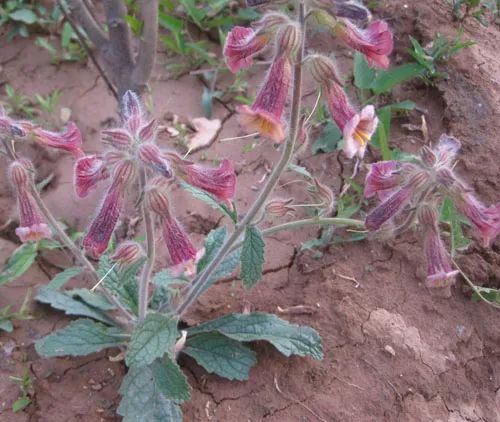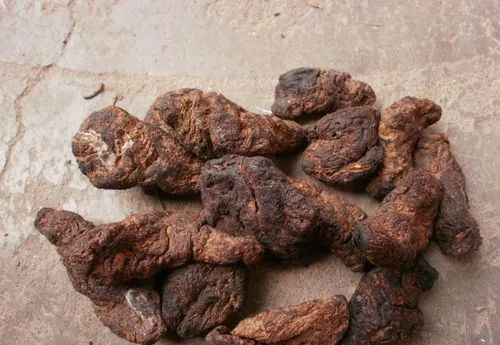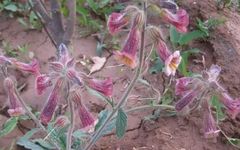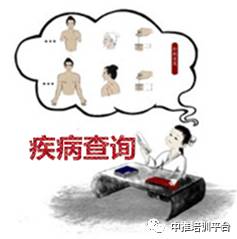
Shú Dì Huánɡ (熟地黄)
Shú Dì Huánɡ: A plant of the family Scrophulariaceae, genus Rehmannia. It grows in sandy loam at altitudes of 50-1100 meters, in barren hills, at the foot of mountains, by walls, and along roadsides, cultivated both domestically and abroad. The rhizome is used medicinally. It is indicated for liver and kidney yin deficiency, soreness and weakness of the lower back and knees, bone steaming and tidal fever, night sweats and seminal emission, internal heat and thirst, blood deficiency and sallow complexion, palpitations and anxiety, irregular menstruation, excessive menstrual bleeding, dizziness and tinnitus, and premature graying of hair. Shú Dì Huánɡ is a processed product of Shēng Dì Huánɡ (生地黄) that is mixed with yellow wine, steamed, and dried, thus its effects differ; the raw form is mainly used for clearing heat and nourishing yin, while the cooked form is primarily used for nourishing blood and tonifying the kidneys.
Image of Shú Dì Huánɡ

Image of Rehmannia Plant

Image of Shú Dì Huánɡ

Image of Shēng Dì Huánɡ
Introduction to Shú Dì Huánɡ
Herb Name: Shú Dì Huánɡ
Pinyin: Shú Dì Huánɡ
Alias: Shú Dì, Dì Huánɡ
Source: This product is a processed product of Shēng Dì Huánɡ.
Characteristics: This product appears as irregular chunks or fragments, varying in size and thickness. The surface is black with a glossy sheen and is highly viscous. The texture is soft yet resilient, not easily broken, with a black and glossy cross-section. It is odorless and has a sweet taste.
Chemical Components: Shú Dì Huánɡ contains a small amount of cyclic ether compounds, including: Leonurus japonicus glycoside, peach leaf coral glycoside, catalpol, Rehmannia glycosides A, B, C, D, and others.
Properties: Sweet, slightly warm.
Meridians Entered: Liver and Kidney meridians.
Storage: Store in a ventilated and dry place.
Contraindications: Contraindicated in cases of spleen and stomach deficiency, qi stagnation with phlegm, abdominal fullness, and loose stools.
Effects of Shú Dì Huánɡ
Nourishes blood and moistens; benefits essence and fills marrow. Indicated for blood deficiency and sallow complexion; dizziness and palpitations; irregular menstruation; excessive menstrual bleeding; liver and kidney yin deficiency; tidal fever and night sweats; seminal emission and impotence; infertility; soreness and weakness of the lower back and knees; tinnitus and hearing loss; blurred vision; premature graying of hair; thirst; constipation; and kidney deficiency with shortness of breath. Shú Dì Huánɡ is a processed product of Shēng Dì Huánɡ, thus its effects differ; the raw form is mainly used for clearing heat and nourishing yin, while the cooked form is primarily used for nourishing blood and tonifying the kidneys.
Usage of Shú Dì Huánɡ
Internal use: 9-15g. — “Chinese Pharmacopoeia”
Internal use: Decoction, 0.4-1 tael; in pills or powders, or as a syrup or tincture. — “Dictionary of Chinese Medicine”
Internal use: Decoction, 10-30g; or in pills or powders; or as a syrup, or tinctured in alcohol. — “Compendium of Chinese Medicinal Herbs”
Formulas with Shú Dì Huánɡ
Note: The following formulas should be used under the guidance of a physician.
1. For men and women with insufficient essence and blood, and insufficient nourishment:
Eight taels of Shú Dì Huánɡ (select the sweetest ones, dried to remove moisture), one tael of sandalwood (or three qian of white sandalwood), and four taels of goji berries (select the fattest ones, dried to remove moisture). Each herb is one jin, soaked in ten jins of high-proof liquor for ten days without boiling, then it can be used. Those who take this should not drink excessively. After finishing, add six or seven jins of liquor, soak for another half month, and it can still be used. (“Complete Works of Jingyue” on Shú Dì Huánɡ syrup)
2. For various deficiencies, abdominal and flank pain, blood loss and shortness of breath, loss of appetite, fever, and women’s menstrual disorders:
Shú Dì Huánɡ (sliced and roasted) and Angelica sinensis (remove the roots, sliced and roasted) in equal parts. Grind finely and form pills the size of a walnut, taking two to three pills before meals with warm water. (“Jifeng Pujifang” on Wanbing Pills)
3. For dark rashes, kidney deficiency, weakness, inability to speak, and paralysis:
Shú Dì Huánɡ, Ba Jiao (remove the heart), Shan Zhu Yu, Shi Hu, Rou Cong Rong (soaked in wine and roasted), Fu Zi (processed), Wu Wei Zi, Guo Gui, Bai Fu Ling, Mai Men Dong (remove the heart), Chang Pu, Yuan Zhi (remove the heart) in equal parts. Grind finely, take three qian with one and a half cups of water, five slices of ginger, one jujube, and mint, decoct until reduced to one cup, without regard to time. (“Xuanming Lunfang” on Shú Dì Huánɡ Decoction)
4. For bone steaming and body heat exhaustion:
Shú Dì Huánɡ, Angelica sinensis, Di Gu Pi, Zhi Ke (roasted with bran), Chai Hu, Qin Jiao, Zhi Mu, Bie Jia (roasted) in equal parts, grind finely, with one cup of water and half a dried plum, decoct until reduced to seven-tenths, and take hot with the plum. (“Youyou Xinshu” on Shú Dì Huánɡ Powder)
5. To regulate and nourish the qi and blood, treat deficiency of Chong and Ren, menstrual irregularities, abdominal pain, excessive bleeding, blood stasis, pain during menstruation, pregnancy complications, and postpartum issues:
Angelica sinensis (remove the leaves, soaked in wine, roasted), Chuan Xiong, Bai Shao, and Shú Dì Huánɡ (soaked in wine and steamed) in equal parts, grind coarsely, take three qian with one and a half cups of water, decoct until reduced to eight-tenths, strain and take hot before meals. (“Jufang” on Si Wu Decoction)
6. For frequent and copious urination:
One tael of You Gu, one tael of Sang Piao Xiao, two taels of Shú Dì Huánɡ, one tael of Tian Wei Gen, and one tael of Huang Lian (remove the beard). Grind finely and sift into a powder, taking two qian before meals with congee. (“Sheng Hui Fang”)
7. For children with kidney deficiency, loss of voice, open forehead, insufficient spirit, excessive white in the mouth, and pale complexion:
Eight qian of Shú Dì Huánɡ, four qian each of Shan Ying Rou and dried Dioscorea, and three qian each of Ze Xie and Mu Dan Pi, Bai Fu Ling (remove the skin). Grind finely, form pills the size of a walnut, and take three pills with warm water on an empty stomach. (“Pediatric Medicinal Formula” on Shú Dì Huánɡ Pills)
|
Click the icon to view |
|||
|
|
|
|
|
| Disease Inquiry | Free Live Broadcast | Clinical Videos | Medical Treasure Trove |
Click below to read the original text and scan the QR code to learn acupuncture and bone setting for free





